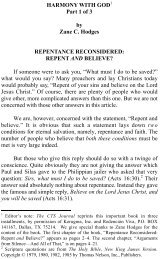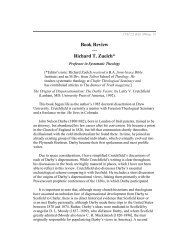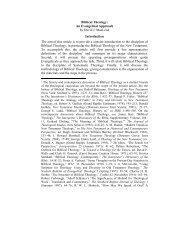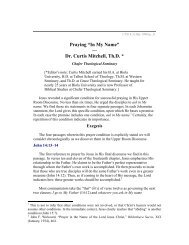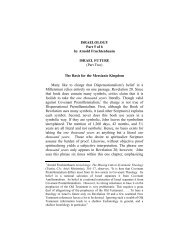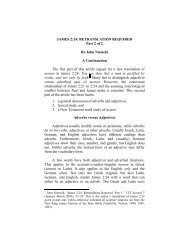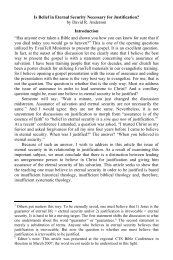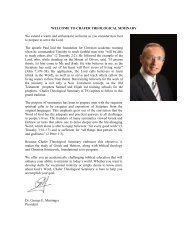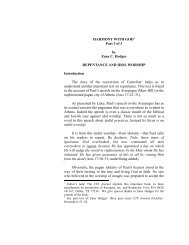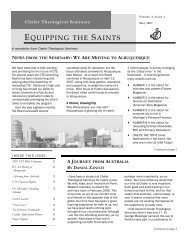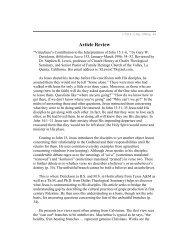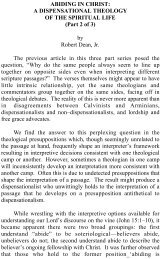Israel's Inheritance: Birthright of the Firstborn Son - Chafer ...
Israel's Inheritance: Birthright of the Firstborn Son - Chafer ...
Israel's Inheritance: Birthright of the Firstborn Son - Chafer ...
Create successful ePaper yourself
Turn your PDF publications into a flip-book with our unique Google optimized e-Paper software.
80 CTS Journal 13 (Spring 2008)<br />
and disobedience, and thus to <strong>the</strong> inheritance <strong>of</strong> <strong>the</strong> birthright. The study<br />
provokes o<strong>the</strong>r stimulating questions. What is <strong>the</strong> nature <strong>of</strong> <strong>the</strong> inheritance <strong>of</strong><br />
those sons who will not inherit <strong>the</strong> birthright, and what is <strong>the</strong> relationship <strong>of</strong> <strong>the</strong><br />
church to <strong>the</strong> inheritance <strong>of</strong> <strong>the</strong> birthright? The goal <strong>of</strong> <strong>the</strong> current study is to<br />
prompt fur<strong>the</strong>r discussion on <strong>the</strong> concept <strong>of</strong> inheritance in Scripture by<br />
suggesting that all <strong>the</strong> children <strong>of</strong> Israel have been born to <strong>the</strong> birthright, but<br />
individuals can lose this inheritance.<br />
“Israel Is My <strong>Firstborn</strong> <strong>Son</strong>”<br />
In <strong>the</strong> Exodus narrative, before <strong>the</strong> final devastating plague, in which all <strong>the</strong><br />
firstborn sons <strong>of</strong> Egypt died, God instructed Moses, “Then you shall say to<br />
Pharaoh, ‘Thus says <strong>the</strong> Lord, “Israel is My son, My first-born. So I said to you,<br />
‘Let My son go, that he may serve Me’; but you have refused to let him go.<br />
Behold, I will kill your son, your first-born’” (Exodus 4:22–23).<br />
The passage stimulates an important question: does Israel refer here to Jacob,<br />
whose name God changed to Israel, or does it refer to <strong>the</strong> children <strong>of</strong> Israel? This<br />
study seeks to demonstrate that Israel, whom God has called his firstborn son, in<br />
this passage refers to all <strong>the</strong> children <strong>of</strong> Israel.<br />
Jewish interpretation since Rashi (born in A.D. 1040) has typically held that<br />
“firstborn son” in Exodus 4:22–23 is “an expression <strong>of</strong> greatness” and its deeper<br />
spiritual meaning is Jacob, whose name God changed to Israel. Thus, Rashi<br />
understands “Israel my firstborn son” as God honoring Jacob with <strong>the</strong> birthright<br />
to which Esau had been born. 4 However, Bonchak observes, “Ironically, Rashi’s<br />
midrashic explanation [Jacob is God’s firstborn son, who is entitled to inherit <strong>the</strong><br />
birthright] takes <strong>the</strong> word ‘firstborn’ literally, while his p’shat explanation [that<br />
is, <strong>the</strong> simple meaning, an expression <strong>of</strong> greatness] takes <strong>the</strong> word<br />
allegorically.” 5 Rashi’s inconsistency invites fur<strong>the</strong>r consideration, especially<br />
since Jewish commentary earlier than Rashi acknowledged <strong>the</strong> simple meaning to<br />
be <strong>the</strong> nation <strong>of</strong> Israel, meaning all <strong>the</strong> people <strong>of</strong> Israel. 6<br />
That God refers to <strong>the</strong> children <strong>of</strong> Israel as “My firstborn son” finds support<br />
within <strong>the</strong> biblical text. For example, in <strong>the</strong> Exodus narrative God told Pharaoh,<br />
“I will kill your firstborn son” (Exodus 4:23). In <strong>the</strong> context, “son” means more<br />
than Pharaoh’s son because all <strong>the</strong> firstborn <strong>of</strong> Egypt, both people and animals,<br />
died in <strong>the</strong> last plague. We should also observe that <strong>the</strong> narrative contrasts <strong>the</strong><br />
firstborn son <strong>of</strong> Pharaoh (implying many) with <strong>the</strong> firstborn son <strong>of</strong> God, namely<br />
Israel, which suggests many ra<strong>the</strong>r than a single son.<br />
A parallel also helps clarify this figurative meaning. Following God’s<br />
declaration, “Israel is my firstborn son,” <strong>the</strong> text continues, “I said to you, Let my<br />
son go that he may worship me.” The “son” is <strong>the</strong> people <strong>of</strong> Israel. The narrative<br />
4 Rabbi Yisrael Isser Zvi Herczeg, ed., Rashi: Commentary on <strong>the</strong> Torah, 4th ed. vol. 2<br />
(New York: Mesorah, 1999), 38.<br />
5 Avigdor Bonchek, What’s Bo<strong>the</strong>ring Rashi? A Guide to In-Depth Analysis <strong>of</strong> His Torah<br />
Commentary: Shemos, vol. 2 (Jerusalem: Feldheim, 1999), 38.<br />
6 b. Seder Mo’ed 89b; b. Seder Nez. 3a.



